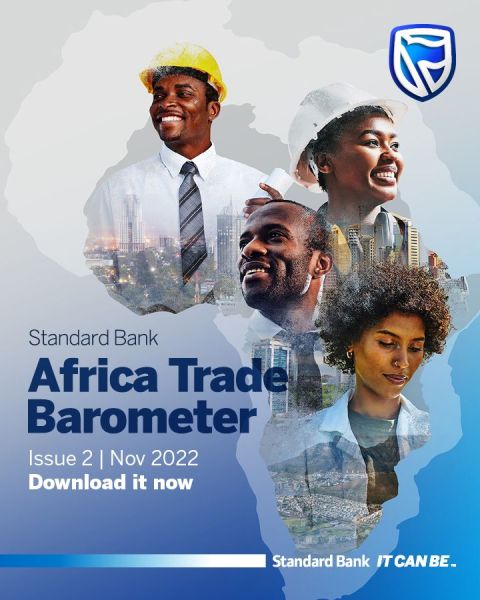First historical comparison reveals a real-time view of Africa’s dynamic business and trade confidence landscape
Standard Bank has shared the results of the second edition of its Africa Trade Barometer. Two quarters after the inaugural edition, the second edition of the Africa Trade Barometer tracks changes, both favourable and otherwise, in the opinions of businesses trading in and between 10 African economies.
“The ability to report changing sentiment over time will position the Africa Trade Barometer as the continent’s leading trade and tradability insight tool, both for African businesses as well as those seeking to do business with Africa,” says Philip Myburgh, Head of Trade and Africa-China at Standard Bank.
Standard Bank’s Africa Trade Barometer represents the views of 2554 African businesses spread across Angola, Ghana, Kenya, Mozambique, Namibia, Nigeria, South Africa, Tanzania, Uganda and Zambia.
Themes examined include views on growth prospects, business confidence as well as opportunities and challenges. Survey results also report on current performance, Covid-19 impact and sentiment on future business investment. In addition, the Africa Trade Barometer shares the views of businesses involved in Africa-China trade and, while recording the impact of the African Continental Free Trade Area Agreement, also details the effects of non-tariff barriers. Business opinion on legislative, policy and financial needs, as well as challenges, are also reflected. Barometer results also report on the types and frequency of trade, where this trade is taking place and the likelihood of African businesses expanding trade internationally.
At its most simple, “observing how opinion has changed within and between markets over the last six months confirms the impact of many observable macro events,” explains Myburgh.
Current data, for example, shows an improvement in business perceptions that the Tanzanian and Ugandan governments are doing more to support trade, “reflecting the recent resumption of trade barrier reduction talks between the two countries,” observes Myburgh.
The second edition also highlights the strong link between effective governance and business confidence and growth.
Kenya’s recently successfully concluded elections, for example, have driven more positive sentiment across the whole East Africa region. Similarly, successful elections in Angola and Zambia, and the change of president in Tanzania, have driven more positive business sentiment in these markets.
“The second edition’s results now enhanced with historical comparison, also reveal more nuanced and often entirely new or unexpected insights, especially at individual country and sector level,” says Myburgh.
Current data, for example, reveals how interest rate hikes by the United States Federal Reserve have increased borrowing across many African markets, negatively impacting business confidence. This trend manifests most profoundly in Ghana where significant inflation and pronounced liquidity constraints have curtailed the country’s ability to import. Add to this Ghana’s heavy reliance on now interrupted Ukrainian wheat supply, coupled with inflated global grain prices “and a clear picture emerges of the risks associated with an over-reliance on US dollar denominated imports,” observes Myburgh.
Second edition data also shows a retreat in business confidence in Mozambique as the impact of the insurgency in the north delays, the progress of planned liquid natural gas investments in the country. In Angola on the other hand, “data shows a strongly positive confidence correlation amongst businesses involved in the country’s booming petrochemicals sector, currently riding high on global supply constraints,” reports Myburgh.
The results also show African businesses seeking to import fewer goods directly from China, replacing direct Chinese imports with Chinese goods from third parties or finding new suppliers entirely. This data shows, in near-real time, how “African businesses are responding to ongoing supply chain constraints in a heavily locked down China,” says Myburgh.
Somewhat counterintuitively, the second edition Africa Trade Barometer data shows no correlation between trade-favourable legislative regimes and business confidence and activity. This might reveal that “when outside observers assess African tradability, they generally only consider one or two data points, usually how closely a country’s trade regime approximates to global best practice,” explains Myburgh.
Yet current Africa Trade Barometer data points to a more nuanced view. Countries and sectors showing positive macro fundamentals, for example, tend to return higher tradability numbers, regardless of their trade regimes. Either way, what is clear from the data is that “the drivers of business and trade confidence in Africa involve far more data points driven by very specific local variables,” observes Myburgh.
A recurring theme across all markets is the centrality of agriculture in Africa.
Standard Bank has observed that higher fertilizer prices and US dollar liquidity constraints have reduced the yield and margin of produce across the continent. Since agriculture contributes a disproportionately large portion of African GDP, shifts in the continent’s agricultural fortunes impact almost every other sector. These insights highlight “the importance of agricultural stability in Africa as well as the opportunity that investment in the sector presents to drive multi-sector growth across the continent,” notes Myburgh.
Standard Bank currently plans to issue the Africa Trade Barometer twice a year. Observing the valuable insight provided by just one historical comparison “excites me about what we will learn going forward as we continue to build and refine Africa’s most comprehensive business tradability index,” concludes Myburgh.
You can view the Trade Barometer here.

